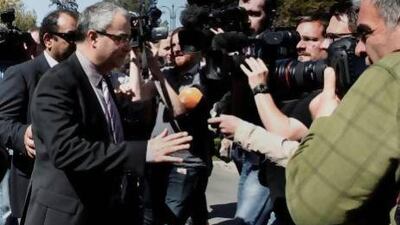NICOSIA // Cyprus turned to Russia yesterday for emergency help to avert a financial meltdown.
The finance minister Michael Sarris went to Moscow seeking a new €5 billion (Dh18.5bn) loan, an extension to an existing €2.5bn loan and a lower interest rate.
An initial meeting with the Russian finance minister Anton Siluanov did not produce a deal. Mr Sarris said talks would continue.
The crisis began at the weekend when the European Union demanded an unprecedented one-off levy of up to 10 per cent on all deposits in Cypriot bank accounts as a condition of a €10bn bailout.
The levy sent shockwaves across the euro zone, where it was viewed as breaking a pledge that €100,000 of savings were protected in the event of a bank collapse. On Tuesday Cyprus's parliament overwhelmingly rejected the levy as "blackmail".
"Turning to Russia is the only alternative left to Cyprus because the EU deal means certain death for the Cypriot economy," said Hubert Faustmann, an analyst at the University of Nicosia.
"This will upset the EU big time, but Cyprus is in such a corner that I think they cannot afford to mind if the EU is upset or not."
At home, the Cyprus government was frantically scrambling to come up with a Plan B to present to the EU to stave off bankruptcy. The president, Nicos Anastasiades, barely a month into the job, held crisis talks with party leaders and the governor of the central bank.
A government spokesman said the cabinet had forged a new proposal aimed at reducing "the €5.8bn haircut from depositors, by borrowing from our own resources". He did not provide details, but it is believed consideration is being given to tapping Cyprus's national state pension fund or issuing new debt.
Banks on the island have been closed since the weekend announcement, to prevent customers from emptying their accounts, and are not expected to reopen until next week - and certainly not until Cypriot authorities come up with a credible financial package.
ATMs have been dispensing cash and debit and credit cards have been working, so Cypriots have not faced any immediate cash shortage for day-to-day living.
Without the EU bailout, the Cypriot banking sector would collapse, devastating the economy and potentially causing the country to leave the euro.
That could convulse global financial markets and endanger deposits in the country even further.
The German chancellor Angela Merkel, who many Cypriots believe was behind the original demand for a bank levy, said yesterday there must be a plan to repair the island's bloated banking sector, and it made sense for holders of large bank deposits to contribute.
"It is our wish that investors under €100,000 not be burdened," Mrs Merkel said. "The Cypriot government had other ideas here; the parliament rejected that."
She said Germany would wait to see what alternative proposal Cyprus offers to international creditors to stave off economic collapse and examine that "with great respect" - but insisted "it is important that Cyprus gets a sustainable banking sector in the future. The current banking sector is not sustainable."
One offer of help came from the Orthodox Church of Cyprus, which has considerable wealth, including property, stakes in a bank, and a brewery. "The entire wealth of the Church is at the disposal of the country … so that we can stand on our own two feet and not on those of foreigners," Archbishop Chrysostomos said after meeting Mr Anastasiades yesterday.
He said parliament had made the right decision in rejecting the bailout terms, "and sent a clear message to Europeans that they should learn to respect smaller countries".
Any Russian rescue plan would be aimed at safeguarding multibillion-euro Russian deposits in Cypriot banks.
Long-standing economic and diplomatic ties bind Russia, a global power with a population of 141 million, and Cyprus, a small and divided but strategically located Mediterranean island of fewer than a million people.
The West is keen to keep Cyprus - home to two unpopular British sovereign military bases - out of Russia's orbit.
Many Cypriot protesters waved Russian flags outside the parliament building during Tuesday night's session when the EU bailout plan was thrown out.
Russian private and corporate deposits in Cyprus, attracted by low tax rates, are believed to total about €30bn, accounting for between a third and half of all deposits in Cypriot banks.
Many believe the EU's bailout plan was meant to ensure that European taxpayers did not spend billions propping up the allegedly ill-gotten gains of some Russians in Cyprus. Nicosia has repeatedly denied being soft on "dirty money", and offered to open its accounts to international inspection.
Russia's president, Vladimir Putin, on Monday lambasted the proposed EU tax on deposits in Cypriot banks as "unfair, unprofessional and dangerous".
But there was speculation Russia might seek to exploit the crisis. Some reports suggested Russia's giant oil and gas company, Gazprom, had mooted its own assistance plan, in exchange for exploration rights to Cyprus's sizeable offshore gas deposits discovered two years ago.
But the company's spokesman, Sergei Kuprianov, said yesterday: "We at Gazprom did not offer Cyprus anything."
Other reports said Moscow was also seeking details about Russian billionaires who hold accounts in Cyprus.
Germany, the EU's main paymaster, infuriated Cypriots after Tuesday night's parliamentary vote by warning that the banks may never reopen if a bailout is not agreed.
Wolfgang Schaeuble, the German finance minister, said the banking system in Cyprus was "bloated" and "not sustainable".
He said: "Someone needs to explain this to the Cypriots."
* Additional reporting by the Associated Press
twitter: For breaking news from the Gulf, the Middle East and around the globe follow The National World. Follow us

